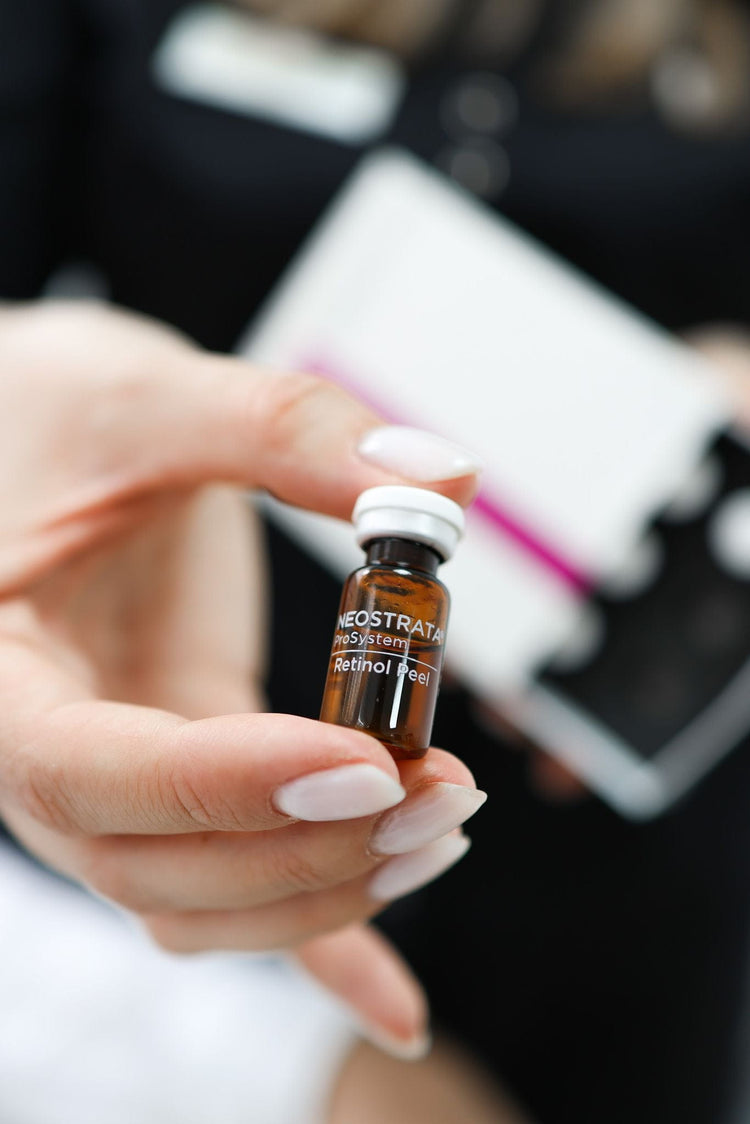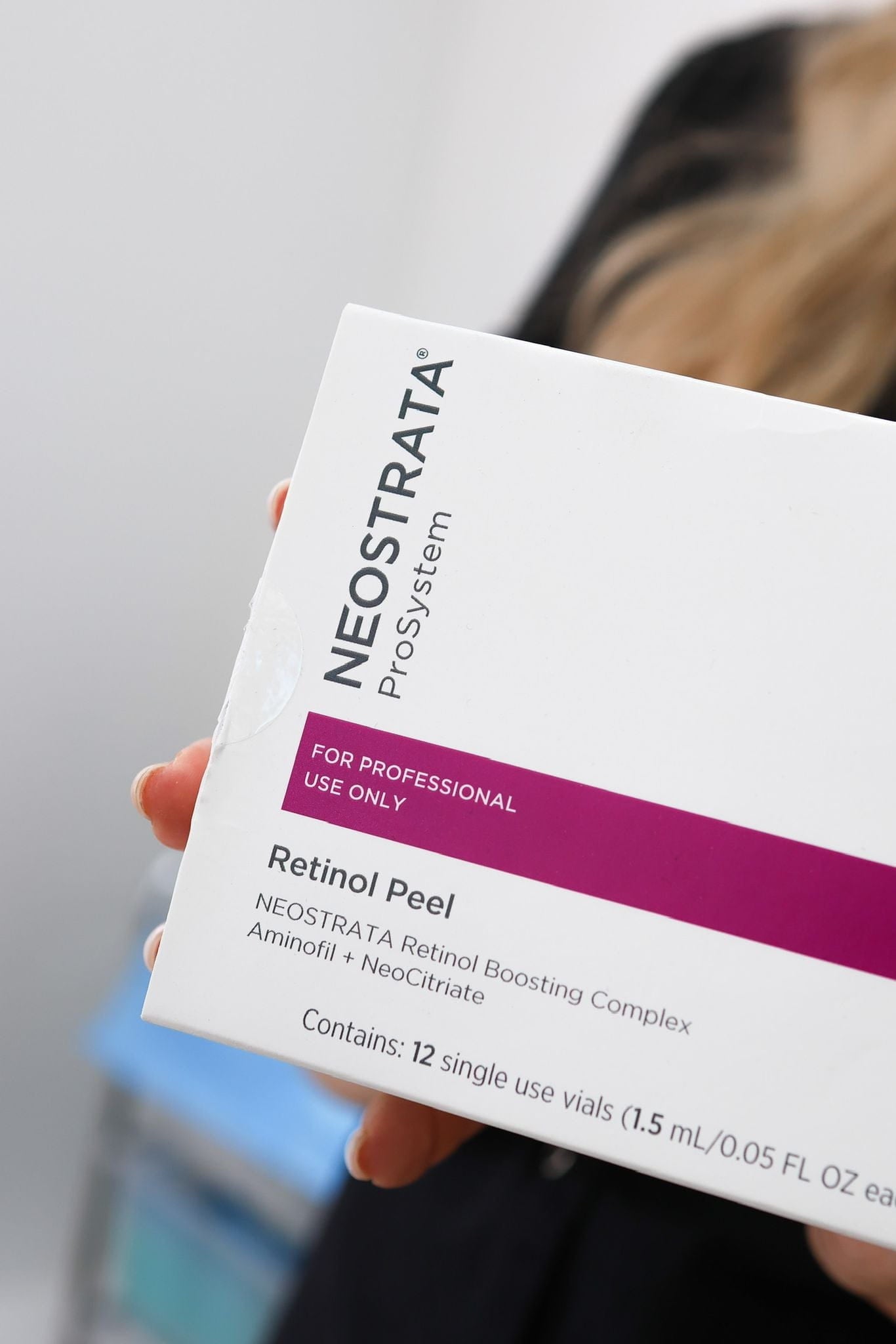Benefits of Retinol Peels for Anti-Aging
Looking to turn back the clock on aging skin in Kingston Upon Thames? Retinol peels are gaining popularity for their potent anti-aging benefits. These chemical peels utilize retinol, a derivative of vitamin A, to exfoliate the skin and stimulate collagen production.
Reduce Fine Lines and Wrinkles
Retinol is renowned for its ability to reduce the appearance of fine lines and wrinkles by boosting collagen synthesis, a protein crucial for skin firmness and elasticity. As we age, collagen production naturally declines, leading to sagging and wrinkles. By stimulating collagen production, retinol peels help restore a smoother, more youthful complexion.
The exfoliating action of retinol peels also helps remove dead skin cells, revealing brighter and smoother skin underneath. This can significantly minimize the appearance of pores and improve overall skin texture.
Improve Skin Tone and Texture
Moreover, retinol peels work to even out skin tone by targeting hyperpigmentation, which is darkening of the skin caused by sun exposure or acne scars. By promoting cell turnover, they help fade these dark spots, resulting in a more radiant and uniform complexion.

If you’re considering retinol peels for anti-aging benefits in Kingston Upon Thames, consulting with a qualified dermatologist is recommended. They can assess your skin type and concerns to determine if retinol peels are right for you and advise on the appropriate treatment protocol.
Boost Collagen Production
Retinol peels offer several benefits for combating signs of aging. One key advantage is their ability to boost collagen production. Collagen is a protein responsible for maintaining skin firmness and elasticity. As we age, collagen levels naturally decline, leading to wrinkles and sagging skin. Retinol stimulates collagen synthesis, helping restore a more youthful and plump appearance.
Beyond collagen stimulation, retinol peels effectively exfoliate the skin. This removes dead skin cells, revealing brighter and smoother skin beneath the surface. Exfoliation also helps minimize the appearance of pores and improves overall skin texture, contributing to a more refined complexion.
Retinol’s ability to target hyperpigmentation makes it beneficial for evening out skin tone. Sun exposure and acne scars can cause dark spots on the skin. Retinol promotes cell turnover, helping fade these dark patches and create a more radiant and uniform complexion.
Minimise Hyperpigmentation
Retinol peels offer several benefits for combating signs of aging. One key advantage is their ability to boost collagen production. Collagen is a protein responsible for maintaining skin firmness and elasticity. As we age, collagen levels naturally decline, leading to wrinkles and sagging skin. Retinol stimulates collagen synthesis, helping restore a more youthful and plump appearance.
Beyond collagen stimulation, retinol peels effectively exfoliate the skin. This removes dead skin cells, revealing brighter and smoother skin beneath the surface. Exfoliation also helps minimize the appearance of pores and improves overall skin texture, contributing to a more refined complexion.
Retinol’s ability to target hyperpigmentation makes it beneficial for evening out skin tone. Sun exposure and acne scars can cause dark spots on the skin. Retinol promotes cell turnover, helping fade these dark patches and create a more radiant and uniform complexion.
How Retinol Peels Work
Retinol peels have emerged as a popular treatment option for individuals seeking to address signs of aging in Kingston Upon Thames. These chemical peels utilize retinol, a derivative of vitamin A, which penetrates the skin to stimulate collagen production and exfoliate dead skin cells.
Chemical Exfoliation
Retinol peels are becoming increasingly popular in Kingston Upon Thames as an effective way to combat signs of aging. These chemical peels work by utilizing retinol, a potent form of vitamin A, to penetrate the skin’s surface and stimulate various beneficial processes.
One key benefit of retinol peels is their ability to boost collagen production. Collagen is a protein essential for maintaining skin firmness and elasticity. As we age, collagen levels naturally decline, leading to the appearance of wrinkles and sagging skin. By stimulating collagen synthesis, retinol peels help restore a smoother, more youthful complexion.
Retinol peels also act as effective exfoliants, removing dead skin cells and revealing brighter, smoother skin underneath. This exfoliation process helps minimize the appearance of pores and improves overall skin texture, contributing to a more refined and even complexion.
Furthermore, retinol targets hyperpigmentation, which can result from sun exposure or acne scarring. By promoting cell turnover, retinol peels help fade these dark spots, leading to a more radiant and uniform skin tone.
Stimulation of Cell Turnover
Retinol peels work by utilizing retinol, a derivative of vitamin A, which penetrates the skin’s layers. This penetration triggers several beneficial processes that combat signs of aging.
One primary mechanism is stimulation of cell turnover. Retinol accelerates the shedding of dead skin cells and the generation of new ones. This constant renewal process reveals brighter, smoother skin and improves overall texture. It also helps minimize the appearance of pores.
Increase in Collagen Synthesis
Retinol peels work by utilizing retinol, a derivative of vitamin A, which penetrates the skin’s layers. This penetration triggers several beneficial processes that combat signs of aging.
One primary mechanism is stimulation of cell turnover. Retinol accelerates the shedding of dead skin cells and the generation of new ones. This constant renewal process reveals brighter, smoother skin and improves overall texture. It also helps minimize the appearance of pores.
Another key benefit is retinol’s ability to boost collagen synthesis. Collagen is a protein essential for maintaining skin firmness and elasticity. As we age, collagen production naturally declines, leading to wrinkles and sagging skin. Retinol stimulates collagen synthesis, helping restore a smoother, more youthful complexion.
Finding a Reputable Clinic in Kingston Upon Thames
Embarking on a journey to rejuvenate your skin in Kingston Upon Thames? Retinol peels have gained significant traction for their remarkable anti-aging effects. These chemical peels leverage retinol, a derivative of vitamin A, to exfoliate the skin and stimulate collagen production, leading to a smoother, more youthful complexion.
Experience and Qualifications of Practitioners
Finding a reputable clinic in Kingston Upon Thames is essential when considering retinol peels or any aesthetic procedure. Look for clinics with qualified practitioners who have experience performing retinol peels and a good understanding of different skin types and concerns.
When evaluating a clinic, inquire about the practitioner’s qualifications and experience. Check if they are licensed dermatologists, plastic surgeons, or registered nurses with specialized training in chemical peels.
Reading online reviews and testimonials from previous patients can also provide valuable insights into the clinic’s reputation and the practitioners’ skills.
Client Reviews and Testimonials
Finding a reputable clinic in Kingston Upon Thames is essential when considering retinol peels or any aesthetic procedure. Look for clinics with qualified practitioners who have experience performing retinol peels and a good understanding of different skin types and concerns.
When evaluating a clinic, inquire about the practitioner’s qualifications and experience. Check if they are licensed dermatologists, plastic surgeons, or registered nurses with specialized training in chemical peels.
Reading online reviews and testimonials from previous patients can also provide valuable insights into the clinic’s reputation and the practitioners’ skills.
Consultation Process and Treatment Plan
Finding a reputable clinic in Kingston Upon Thames is essential when considering retinol peels or any aesthetic procedure. Look for clinics with qualified practitioners who have experience performing retinol peels and a good understanding of different skin types and concerns.
When evaluating a clinic, inquire about the practitioner’s qualifications and experience. Check if they are licensed dermatologists, plastic surgeons, or registered nurses with specialized training in chemical peels.
Reading online reviews and testimonials from previous patients can also provide valuable insights into the clinic’s reputation and the practitioners’ skills.
The consultation process typically involves a thorough skin evaluation by the practitioner. They will ask about your medical history, skin concerns, and desired outcomes.
They will examine your skin to assess its condition, type, and any existing issues like acne, hyperpigmentation, or wrinkles.
Based on their assessment, they will discuss the suitability of retinol peels for your specific needs and explain the procedure in detail, including potential risks and benefits.
During the consultation, it’s important to ask any questions you may have about the treatment process, expected results, downtime, and aftercare instructions.
The treatment plan will be tailored to your individual needs and skin concerns.
Factors such as skin type, severity of aging signs, and desired outcome will influence the number of sessions recommended, the concentration of retinol used, and the frequency of treatments.
Your practitioner will provide a personalized plan outlining the treatment schedule, expected results, and any necessary pre- and post-treatment instructions.
It’s crucial to follow their recommendations carefully for optimal results and minimize any potential side effects.
Preparing for a Retinol Peel
Looking to turn back the clock on aging skin in Kingston Upon Thames? Retinol peels are gaining popularity for their potent anti-aging benefits. These chemical peels utilize retinol, a derivative of vitamin A, to exfoliate the skin and stimulate collagen production.
Skincare Routine Adjustments
Before undergoing a retinol peel, it’s essential to adjust your skincare routine to prepare your skin and minimize potential side effects.
Firstly, reduce your use of other retinoids or acids in your skincare regimen. Combining retinol with these ingredients can increase the risk of irritation and sensitivity.
Next, start using a gentle cleanser and moisturizer suitable for sensitive skin. This will help protect your skin barrier during the treatment process.
In the weeks leading up to your peel, wear broad-spectrum sunscreen with an SPF of 30 or higher daily. Protecting your skin from sun damage is crucial as retinol can increase skin sensitivity to the sun.

Finally, avoid any harsh exfoliants or scrubs, as they can irritate your skin and make it more susceptible to peeling and redness.
Avoiding Sun Exposure
Protecting your skin from the sun is paramount after undergoing a retinol peel. Retinol increases skin sensitivity to UV radiation, making you more prone to sunburn and hyperpigmentation.
Therefore, for at least a few weeks following your treatment, diligently apply broad-spectrum sunscreen with an SPF of 30 or higher every day, even on cloudy days.
Avoid prolonged sun exposure, including tanning beds and sunlamps.
Wear protective clothing like hats and sunglasses to further shield your skin from the sun’s harmful rays.
Consultation with the Clinician
Before undergoing a retinol peel, it’s essential to adjust your skincare routine to prepare your skin and minimize potential side effects.
- Reduce your use of other retinoids or acids in your skincare regimen. Combining retinol with these ingredients can increase the risk of irritation and sensitivity.
- Start using a gentle cleanser and moisturizer suitable for sensitive skin. This will help protect your skin barrier during the treatment process.
- In the weeks leading up to your peel, wear broad-spectrum sunscreen with an SPF of 30 or higher daily. Protecting your skin from sun damage is crucial as retinol can increase skin sensitivity to the sun.
- Avoid any harsh exfoliants or scrubs, as they can irritate your skin and make it more susceptible to peeling and redness.
Protecting your skin from the sun is paramount after undergoing a retinol peel. Retinol increases skin sensitivity to UV radiation, making you more prone to sunburn and hyperpigmentation.
- Therefore, for at least a few weeks following your treatment, diligently apply broad-spectrum sunscreen with an SPF of 30 or higher every day, even on cloudy days.
- Avoid prolonged sun exposure, including tanning beds and sunlamps.
- Wear protective clothing like hats and sunglasses to further shield your skin from the sun’s harmful rays.
Aftercare Instructions for Optimal Results
Aftercare instructions are crucial for maximizing the benefits of your retinol peel and minimizing potential side effects.
Soothing and Protecting the Skin
Following a retinol peel, it’s important to give your skin time to heal and regenerate. Avoid using harsh products or exfoliants for at least a few days after the treatment.
Gentle cleansing with a mild cleanser is recommended. Pat your skin dry instead of rubbing it.
Moisturize regularly with a hydrating lotion or cream formulated for sensitive skin. This will help keep your skin hydrated and soothe any dryness or irritation.
Avoid makeup and other cosmetics immediately after the peel, as this can clog pores and irritate your skin.
You may experience some redness, peeling, or sensitivity in the days following the treatment. This is normal and should subside within a few days to a week.
If you notice any unusual symptoms such as excessive redness, swelling, or pain, consult with your dermatologist immediately.
Sun Protection Measures
Aftercare instructions are crucial for maximizing the benefits of your retinol peel and minimizing potential side effects. Following your retinol peel, it’s important to allow your skin time to heal and regenerate. Avoid using harsh products or exfoliants for at least a few days after the treatment.
Gentle cleansing with a mild cleanser is recommended. Pat your skin dry instead of rubbing it. Moisturize regularly with a hydrating lotion or cream formulated for sensitive skin. This will help keep your skin hydrated and soothe any dryness or irritation.
Avoid makeup and other cosmetics immediately after the peel, as this can clog pores and irritate your skin. You may experience some redness, peeling, or sensitivity in the days following the treatment. This is normal and should subside within a few days to a week.
If you notice any unusual symptoms such as excessive redness, swelling, or pain, consult with your dermatologist immediately.
Protecting your skin from the sun is crucial after undergoing a retinol peel because retinol increases sensitivity to UV radiation. Apply broad-spectrum sunscreen with an SPF of 30 or higher every day for at least a few weeks following the treatment, even on cloudy days.
Avoid prolonged sun exposure, including tanning beds and sunlamps. Wear protective clothing like hats and sunglasses when outdoors to further shield your skin from the sun’s harmful rays.
When choosing sunscreen for aftercare, select one that is broad-spectrum, meaning it protects against both UVA and UVB rays.
Look for a water-resistant formula that will stay effective even if you sweat or swim.
Reapply every two hours, especially after swimming or sweating, to maintain adequate sun protection.
Follow-Up Appointments
Retinol peels offer several benefits for combating signs of aging. One key advantage is their ability to boost collagen production. Collagen is a protein responsible for maintaining skin firmness and elasticity. As we age, collagen levels naturally decline, leading to wrinkles and sagging skin. Retinol stimulates collagen synthesis, helping restore a more youthful and plump appearance.
Beyond collagen stimulation, retinol peels effectively exfoliate the skin. This removes dead skin cells, revealing brighter and smoother skin beneath the surface. Exfoliation also helps minimize the appearance of pores and improves overall skin texture, contributing to a more refined complexion.
Retinol’s ability to target hyperpigmentation makes it beneficial for evening out skin tone. Sun exposure and acne scars can cause dark spots on the skin. Retinol promotes cell turnover, helping fade these dark patches and create a more radiant and uniform complexion.
Aftercare instructions are crucial for maximizing the benefits of your retinol peel and minimizing potential side effects. Following your retinol peel, it’s important to allow your skin time to heal and regenerate.
- Avoid using harsh products or exfoliants for at least a few days after the treatment.
- Gentle cleansing with a mild cleanser is recommended. Pat your skin dry instead of rubbing it.
- Moisturize regularly with a hydrating lotion or cream formulated for sensitive skin. This will help keep your skin hydrated and soothe any dryness or irritation.
- Avoid makeup and other cosmetics immediately after the peel, as this can clog pores and irritate your skin
- You may experience some redness, peeling, or sensitivity in the days following the treatment. This is normal and should subside within a few days to a week.
Protecting your skin from the sun is paramount after undergoing a retinol peel because retinol increases sensitivity to UV radiation.
- Therefore, for at least a few weeks following the treatment, diligently apply broad-spectrum sunscreen with an SPF of 30 or higher every day, even on cloudy days.
- Avoid prolonged sun exposure, including tanning beds and sunlamps.
- Wear protective clothing like hats and sunglasses when outdoors to further shield your skin from the sun’s harmful rays.
When choosing sunscreen for aftercare, select one that is broad-spectrum, meaning it protects against both UVA and UVB rays. Look for a water-resistant formula that will stay effective even if you sweat or swim. Reapply every two hours, especially after swimming or sweating, to maintain adequate sun protection.
- Why Are My 11 Lines So Bad? - November 9, 2025
- What Is Tear Trough Filler Used For - November 7, 2025
- Weed Infused Mocktails For Every Mood - November 5, 2025
